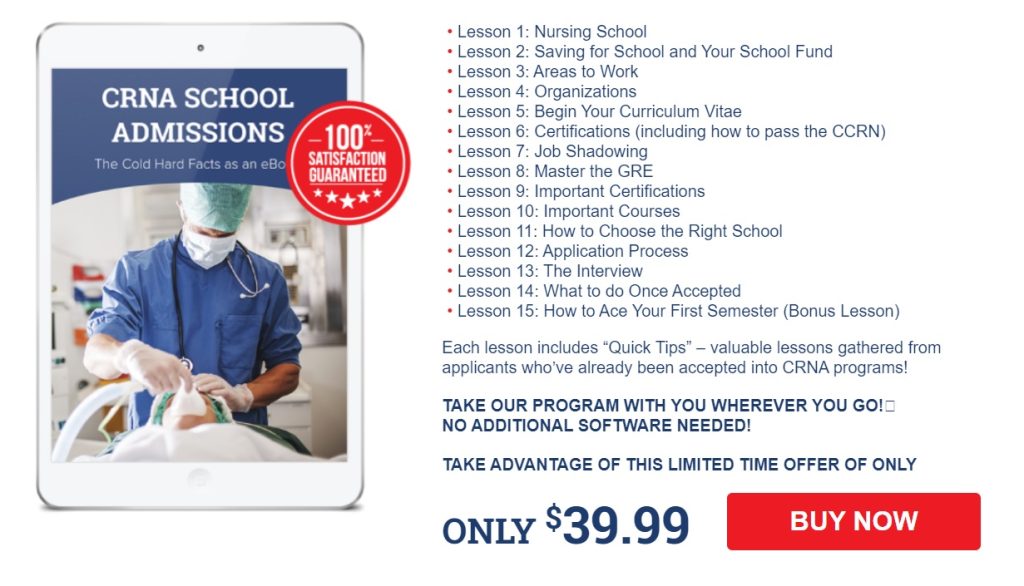If you’re considering a career as a Certified Registered Nurse Anesthetist (CRNA), it’s essential to find the right CRNA program that aligns with your career goals and aspirations. The admissions process for CRNA schools can be competitive, as these programs attract highly motivated and qualified individuals. In this article, we will provide a comprehensive review and guide to CRNA school admissions, helping you navigate through the process and increase your chances of acceptance.
1. Understanding CRNA Program Accreditation
One of the first things you should consider when researching CRNA programs is their accreditation. Accreditation ensures that the program meets certain educational standards and prepares students for the rigorous demands of the CRNA profession. The Council on Accreditation of Nurse Anesthesia Educational Programs (COA) is the recognized accrediting body for CRNA programs in the United States.

2. Factors to Consider When Choosing a CRNA School
Choosing the right CRNA school is a crucial decision that can impact your education and future career. Here are some key factors to consider:
- Program Reputation: Look for schools with a strong reputation for producing successful CRNAs. Consider factors like program outcomes, alumni achievements, and faculty expertise.
- Clinical Experiences: A robust clinical experience is essential for developing the skills required in anesthesia practice. Evaluate the program’s affiliations with reputable healthcare institutions and the diversity of clinical sites.
- Curriculum and Specializations: Review the curriculum to ensure it aligns with your career goals. Some programs offer specialized tracks or concentrations, such as pediatric anesthesia or pain management.
- Faculty and Resources: Learn about the qualifications and expertise of the faculty members. Adequate faculty-to-student ratios and access to learning resources can enhance your educational experience.
- Location and Cost: Consider the location of the school and the cost of tuition and living expenses. Evaluate whether the program offers financial aid or scholarships to help alleviate the financial burden.

3. Admissions Requirements for CRNA Programs
CRNA programs have specific admissions requirements that you must meet to be considered for acceptance. While these requirements can vary across institutions, here are some common prerequisites:
- Bachelor of Science in Nursing (BSN) degree or equivalent.
- Active and unrestricted registered nurse (RN) licensure.
- Minimum cumulative GPA, often around 3.0 on a 4.0 scale.
- Completion of prerequisite courses, including chemistry, anatomy, physiology, and statistics.
- Clinical experience in critical care settings, such as the intensive care unit (ICU).
It’s important to note that meeting the minimum requirements does not guarantee acceptance into a CRNA program. Competition can be fierce, and programs often look for candidates with exceptional academic achievements, relevant work experience, and strong letters of recommendation.
4. Application Process for CRNA School
The application process for CRNA school typically involves the following steps:
- Researching and selecting potential programs: Use online resources and rankings to identify CRNA programs that align with your goals.
- Submitting applications: Complete the applications for your chosen programs, ensuring that you provide all required documents, such as transcripts, letters of recommendation, and a resume.
- Taking the GRE: Some CRNA programs may require applicants to take the Graduate Record Examination (GRE). Prepare for the exam and allow ample time for scores to be reported.
- Writing a personal statement: Craft a compelling personal statement that highlights your passion for anesthesia, your experiences, and your career goals. This is your opportunity to stand out from other applicants.
- Preparing for interviews: If invited, prepare for interviews by researching common interview questions, practicing with a friend, and ensuring you have a solid understanding of the program and the profession.

5. Crafting an Impressive Personal Statement
Your personal statement is an important component of your CRNA school application. It allows you to showcase your unique qualities and experiences. Here are some tips for crafting an impressive personal statement:
- Be authentic: Write in your own voice and be genuine about your motivations for pursuing a career as a CRNA.
- Highlight relevant experiences: Discuss your clinical experiences in critical care settings and how they have influenced your decision to become a CRNA.
- Connect your experiences to the program: Research the program and emphasize how their curriculum and resources align with your goals and aspirations.
- Show your commitment and dedication: Demonstrate your passion for the field and your willingness to work hard to succeed as a CRNA.
6. Preparing for the CRNA School Interview
If you are selected for an interview, congratulations! This is an opportunity for the admissions committee to assess your interpersonal skills, critical thinking abilities, and suitability for the program. Here are some tips to help you prepare for your CRNA school interview:
- Research the program: Familiarize yourself with the program’s mission, curriculum, and faculty members. This knowledge will show your genuine interest and commitment.
- Practice common interview questions: Prepare responses to common interview questions, such as why you want to become a CRNA, how you handle stress, and how you manage conflicts in a team.
- Showcase your knowledge: Be prepared to discuss current healthcare issues, anesthesia practices, and advancements in the field. Stay up-to-date with recent research and developments.
- Dress professionally: Dress appropriately for the interview to make a positive impression. Opt for professional attire and maintain a confident and respectful demeanor.

7. Financial Considerations and Scholarships for CRNA Students
Financing your CRNA education can be a significant consideration. Tuition costs for CRNA programs can be substantial, but there are various financial aid options and scholarships available to help ease the financial burden. Here are some strategies to consider:
- Explore federal student aid: Complete the Free Application for Federal Student Aid (FAFSA) to determine your eligibility for federal grants and loans.
- Research scholarships and grants: Many organizations and institutions offer scholarships specifically for nursing students pursuing advanced degrees in anesthesia. Research and apply for these opportunities.
- Consider employer sponsorship: If you are currently working as an RN, inquire about employer-sponsored educational benefits. Some healthcare organizations may offer tuition reimbursement or financial assistance in exchange for a commitment to work as a CRNA upon graduation.
8. Work Settings and Career Outlook for CRNAs
CRNAs play a vital role in the healthcare system, providing anesthesia care to patients in a variety of settings. They work collaboratively with surgeons, anesthesiologists, and other healthcare professionals to ensure safe and effective anesthesia delivery. CRNAs can practice in various settings, including:
- Hospitals and surgical centers
- Obstetric units and delivery rooms
- Pain management clinics
- Military and veterans’ healthcare facilities
- Research and academic institutions
The demand for CRNAs is expected to remain strong, driven by factors such as an aging population, advancements in surgical techniques, and an increased emphasis on pain management. According to the Bureau of Labor Statistics, the employment of nurse anesthetists is projected to grow by 14% from 2020 to 2030, much faster than the average for all occupations.
Frequently Asked Questions (FAQs)
Q1: What is the average duration of a CRNA program? A: The average duration of a CRNA program is typically around 2-3 years, depending on the specific program and whether it is offered on a full-time or part-time basis.
Q2: Can I pursue a CRNA program with an Associate Degree in Nursing (ADN)? A: Most CRNA programs require applicants to have a Bachelor of Science in Nursing (BSN) degree or equivalent. However, some programs may offer bridge options or accelerated BSN programs for ADN-prepared nurses.
Q3: Are there online CRNA programs available? A: Yes, there are online CRNA programs available; however, these programs often require some on-campus or clinical components to ensure hands-on learning and clinical experience.
Q4: How much does a CRNA program cost? A: The cost of CRNA programs can vary significantly depending on factors such as the institution, location, and whether you are an in-state or out-of-state student. Tuition costs can range from $20,000 to $60,000 per year.
Q5: What is the difference between a CRNA and an anesthesiologist? A: While both CRNAs and anesthesiologists are involved in providing anesthesia care, there are some differences in their education and scope of practice. CRNAs are advanced practice registered nurses who work under the supervision of anesthesiologists or independently, depending on state regulations. Anesthesiologists, on the other hand, are medical doctors who specialize in anesthesia and pain management.
Conclusion
Choosing the right CRNA program and successfully navigating the admissions process are essential steps in your journey to becoming a Certified Registered Nurse Anesthetist. By understanding the accreditation process, meeting the admissions requirements, and presenting a compelling application, you can increase your chances of acceptance into a CRNA program. Remember to carefully consider factors like program reputation, clinical experiences, curriculum, and financial considerations when selecting a CRNA school. With dedication, hard work, and a passion for anesthesia, you can embark on a rewarding and fulfilling career as a CRNA.
